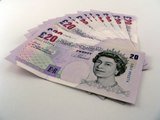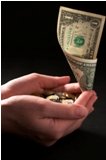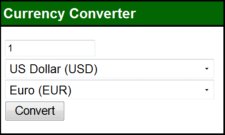Travel Money
Travel money advice on using foreign currency for your travel cash. Read on to see my information and advice.
Regarding cash, you can take travel money in 2 ways – either take your own home currency (and look to convert it when you are in another country) or buy some travel cash in the currency used in the country you are going to.
In a lot of Western countries, the use of cards has overtaken the amount of cash purchases. However, cash is still the easiest and most versatile way of paying for things.

Buying travel money is a confusing business. It is very difficult to identify which company offers the best prices for travel money, as each provider has different deals and special offers, some have fess and some don't, and the exchange rates and the providers' buying and selling 'spread' changes every day.
Exchange Rate
The foreign currency exchange rate changes each day according to the international money markets, so there are many opportunities for providers to change their offer.
Selling/Buying Spread
The 'spread' is the difference between a provider's selling price and their buying price. This spread is where they make their money! Along with the exchange rate that changes on a day-to-day basis, they can also modify their selling/buying spread. So if you did a comparison on different days, the same providers are not always in the same position relative to each other.
No Fee Buy Back
When you buy your foreign currency, you often find providers will convert the foreign currency notes back to your own free of charge. This means that you won't pay a fee ("no commission"), but you will pay their buy-back rate. So, for all the foreign money providers that offer 0% commission or commission free, this is how you compare them.
A buy-back for your spare foreign currency can be quite useful when you return. However, you'll need the receipt that shows you bought the travel currency from them.
Commission Free?
A sign saying 'commission free' doesn't automatically mean you're going to get the best deal on your foreign currency. In fact, you will often be offered a poor exchange rate AND a wider spread. However, if their exchange rate is competitive it is worth looking at them. Also, don't rule out providers that do charge commission, as their rates can still be more competitive.
Fees
Watch out for flat fees and minimum charges. These make it expensive to change small amounts of money, but they can offer good value if you are changing larger sums of money. Again, it is worth shopping around to get the best deal.

Another fee to look out for is a handling fee. These can be quite expensive relative to each transaction. This is what puts me off using credit cards (and debit cards) abroad. For example, it is not a good deal or cost effective to use credit card to a purchase small items in shops or a meal (say under $40 USD or £30 GBP) as you'll be charged a handling fee and will receive a poor exchange rate. It could cost you an extra 20% or more to make purchases this way.
Offers
Some providers offer existing customers special offers. For example, your bank might offer a preferential rate because you are an account holder. Another example is your travel agents offering you a good deal when you purchase your currency with the travel purchases (holiday, flight, hotel, insurance, etc).
My Advice
The only way to really work out the best deal is to take a figure of how much you think you will need for your trip in your own currency (say, £100 GBP for me seeing as I'm in the UK) and ask or work out how much of the foreign currency (say, Euros, Dollars or whatever other currency) you will receive from each provider.
This means you are not getting confused by the figures, you are simply comparing one with another from each provider, and the exchange rate, their selling price and any special offers will be automatically calculated and taken into account.
I think providers find it quite useful that the customers are confused, as people are more likely to purchase at the easiest site rather than shop around.
Over time, if you do shop around regularly, you can get a feeling for which providers are generally competitive, although there are always going to be special offers and deals that make it worthwhile comparing different providers.
For example, in Britain, I find that the travel agent, Thomas Cook, regularly offers the best rates and is generally the most cost effective. Online, Travelex always has a good price for buying travel money. However, I still shop around and buy from other places if they have good offers on their foreign currency.
It is best to take some of your travel money as cash, but not all of it. If you take at least a little bit of travel money in the foreign currency, you will have some to spend on essentials when you first arrive (for example, food and drink in the airport, or for transportation).
Another hard won piece of advice is DO NOT buy your foreign currency from the airport's bureau de change. They have very poor exchange rates and high fees. Make sure you arrange your travel money well in advance. Even if you have to travel at very short notice, buy your travel money on the high street rather than in the airport.
In some countries (generally poorer or less stable economies), you may be able to get by entirely with American money or other local generally accepted global currency (Euros, British Pounds, etc). The US dollar is the de facto standard for this. However, the Euro and some other currencies may also be accepted. Also, in some regions of the world, it may be possible to use the local hard currencies in smaller countries where there are economically strong neighbours.
A hard currency can also often be used wherever there are lots of tourists, even in Western countries like the UK. However, this is generally only where there is enough trade in the foreign currency to make it worth the while of the retailer to exchanging it at their bank.
Using a hard currency like this means you will often be charged a very high rate for this by shops and hotels. You will also generally get local currency as change from your purchases, but this is not a cost effective way to change your money. You also need to make sure the paper money you take is in good condition for this.
Also, watch out for buying from non-reputable people on the black market. It is generally illegal and you cannot compare exchange rates effectively.
Positive Reasons for using Cash
- Cash is the most used method for trading there is. Pretty much most places will take cash.
- Cash is also the easiest to use (but, also the easiest to lose or have stolen)
- It is the most easily convertible.
- If you need a reserve amount in your budget, you can take your own currency and look to convert it as and when you need to.
- For some people, travel money cards (for example credit cards with charges or prepaid cards) are off-putting and using the wrong one can be risky or expensive.
However, there are some exceptions. For example, places that need a deposit or some form of identification, such as car rental/hire companies.
Negative Reasons
- The biggest negative to travel cash it that it is the easiest to lose or have stolen. If you lose it you can't get it back. Likewise, carrying too much cash puts you at risk of having it stolen.
- Check how much your travel insurance will cover if it is stolen and don't take more you need.
- By shopping around for the right prepaid card, you will almost certainly save money when compared to exchanging your home currency for foreign travel money.
It is safer to take some cash and other forms of payment.
Finally, as with any normal handling of cash, be safe and sensible. If you carry lots, separate it and store it away from other valuables. Try not to leave it in your suitcase when you go out. Perhaps look at using the hotel safe, but use an envelope or packet to keep it hidden and disguised.
Return from the Travel Money page to the Exchange Rate home page









New! Comments
Have your say about what you just read! Leave me a comment in the box below.